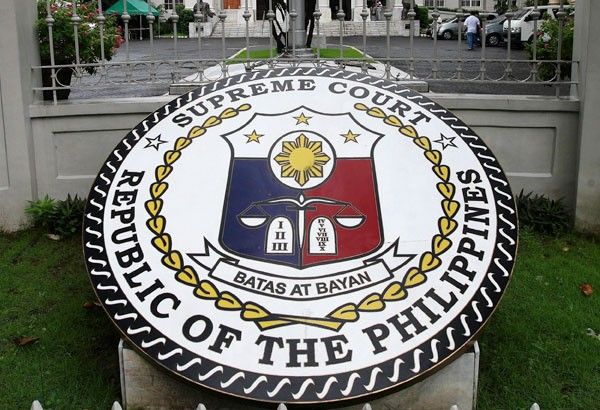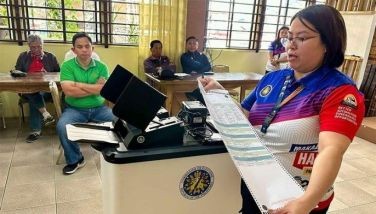JBC quizzes Supreme Court aspirants on controversial cases

MANILA, Philippines — Aspirants for Supreme Court associate justice on Thursday fielded questions on judicial independence, the controversial quo warranto ruling, divorce law, and their capacities to be one of the country’s top magistrates.
The Judicial and Bar Council held its public interview of the six vying to take the seat of Associate Justice Presbitero Velasco Jr., who is due to retire in August.
Others vying for the spot, but who have already been interviewed by the JBC, are Court Administrator Midas Marquez and Court of Appeals Associate Justices Ramon Bato Jr., Apolinario Bruselas Jr., Rosmari Carandang, Ramon Paul Hernando, and Jose Reyes Jr.
Following the public interview, the JBC will submit a shortlist of qualified candidates to President Rodrigo Duterte.
Velasco’s replacement will be Duterte’s fifth appointee to the high court.
Judicial independence
Court of Appeals Associate Justice Oscar Badelles was first to face the JBC panel.
Asked how he will exercise independence “given that [President Rodrigo Duterte] is in control of the will” of the government, Barelles asserted his independence in making decisions. “In resolving cases I would like to state, I usually rely on evidence and applicable laws thereon, so whatever the opinion the president has on the matter has no bearing,” he replied.
For CA Justice Manuel Barrios, “judicial independence may be under attack,” but, for him, that is part of democracy.
“In a democracy, each one, every person has a right to say his or her piece, without prior restraint,” Barrios said, adding that for him judicial independence is not under attack, at his sala at the appellate court, he “does not feel it.”
Court observers and critics point out that the President Rodrigo Duterte’s influence on the judiciary has been highlighted in the Supreme Court's ruling on the quo warranto petition that removed Maria Lourdes Sereno from office.
Duterte had publicly declared that he was an "enemy" of the chief justice. The statement was made after Sereno repeatedly hinted that the president was behind attempts to unseat her.
The lone trial court judge who faced the JBC on Thursday was Davao City Regional Trial Court Judge Carlos Espero II. He was the third quizzed by the JBC panel.
Espero, who also has a pending application for the ombudsman post, heads a designated court for drug cases in Davao. In his interview with the JBC, the Davao judge defended the president.
RELATED: Who's who: A look at candidates aspiring to be the next ombudsman
“Knowing the guy, I don’t think he interferes with anybody. In fact, even in Davao City, I have not heard of anything [on] he himself interfering with the affairs of the judiciary in Davao City,” Espero said.
Philippine Airlines-FASAP case
During the afternoon session of the public interview, CA Justice Ramon Garcia was asked to discuss a recent ruling of the SC.
Garcia cited the case involving Philippine Airlines and the Flight Attendants and Stewards Association of the Philippines. The SC, in March, ruled that there was no illegal retrenchment of more than 1,000 FASAP members. The court also junked their bid for damages over an unfair labor practice charge.
The CA justice said that he does not agree with the decision. He admitted that while he has yet to read the full ruling, he was “taught in law school that there should be an end to every litigation.”
Critics said that the SC “flip-flopped” on the ruling. Associate Justice Marvic Leonen, who dissented from the majority in the ruling, said: “This is an extraordinary case. Like in the Book of Revelations, it involves the miraculous resurrection of the dead: In this case, a dead case.”
US Supreme Court 'cake case'
CA Justice Amy Lazaro-Javier was asked on a landmark case tackled by the US Supreme Court that sided with a baker who, due to his religious convictions, refused to bake a cake for a gay couple.
Javier was asked what she would do if the case had been raffled to her. She stressed that “violations of the bill of rights must be committed by the state itself.” She stressed that the case “does not involve state intrusion.”
Javier added that if she was the baker in the case, she would refuse the order. “I might just be motivated by revenge. This is a contract, and it is a contract to do and a contract to do may not be compelled.”
Withdrawal from International Criminal Court
Last to face the panel was former Ateneo Law School Dean Cesar Villanueva, who is also the lone lawyer from the private practice interviewed by the panel.
Villanueva was asked to weigh in whether the president can decide to withdraw from the International Criminal Court unilaterally—an issue that faces two legal challenges at the Supreme Court.
The former law dean said: "According to the text, the ability to withdraw is the ablity of the president. But, according to the Senate, since it is a form of treaty, it shoud receive the concurrence of the Senate."
- Latest
- Trending




























